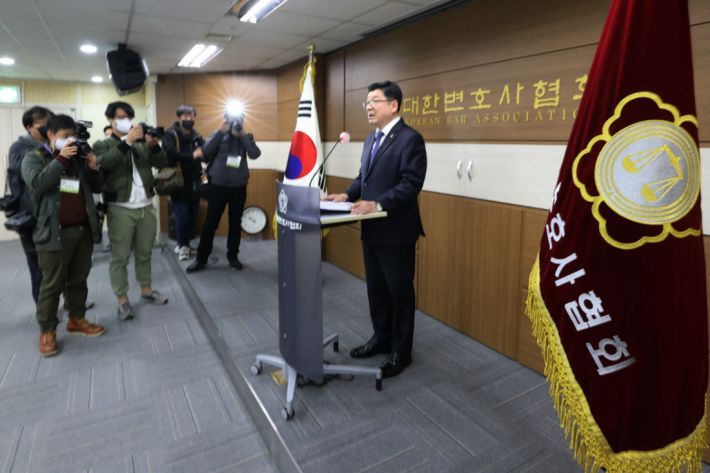Parties in process to pick inaugural chief of new anti-corruption probe body
By YonhapPublished : Nov. 10, 2020 - 11:57

Eleven seasoned legal professionals have been nominated to lead an envisioned organization tasked with investigating corruption among high-ranking government officials, as doubts remain over whether the organization will be launched anytime soon amid a drawn-out partisan strife.
The nominations were filed earlier this week by a seven-member panel of government officials and outside experts, entrusted to designate two final candidates for the top post of the Corruption Investigation Office for High-ranking Officials (CIO).
The candidate recommendation committee will hold a meeting on Friday to start the screening of the nominees' qualifications to choose two finalists fit for the inaugural leadership of the new organization.
The introduction of the independent probe body with the authority to prosecute cases, a right currently exclusive to the state prosecution service, is at the core of President Moon Jae-in's strenuous push for the reform of the country's key law enforcement bodies, especially the prosecution.
Championed by the ruling Democratic Party, which holds an absolute majority of 174 seats in the 300-member National Assembly, a law mandating CIO's launch went into effect on July 15.
A major setback is a fierce protest by the conservative main opposition party.
The People Power Party (PPP) could upend the process leading to the two final candidates' designation, via the veto power held by two PPP-side members of the recommendation committee.
By law, the panel is required to propose two candidates for the president to pick one. The finalists require consent from at least six of the seven panel members.
Wary of the veto power, the ruling party plans to accelerate efforts, on the sidelines of the recommendation process, to amend the related law to lower the bar in approving the two final candidates, with an eye to launching the new investigative body within this month.
The rival parties have been at odds with each other over the sensitive issue.
"I hope that the recommendation committee can follow through with its future plans without delay ... as to be able to appoint the (CIO) head within this month," Rep. Lee Nak-yon, chairman of the Democratic Party (DP), said during a recent meeting of the top party council.
The PPP, however, urged a prudent and thorough approach.
Its spokesman Rep. Kim Sung-won said the nomination process should be done "in an exhaustive manner," as side effects would fully be felt by the people if it is launched in a "hasty, flimsy way."
Among the 11 candidates, the DP side recommended two judge-turned-lawyers, while the PPP side suggested four former state prosecutors.
The others were selected by the Supreme Court, the Ministry of Justice and the Korea Bar Association. (Yonhap)
The nominations were filed earlier this week by a seven-member panel of government officials and outside experts, entrusted to designate two final candidates for the top post of the Corruption Investigation Office for High-ranking Officials (CIO).
The candidate recommendation committee will hold a meeting on Friday to start the screening of the nominees' qualifications to choose two finalists fit for the inaugural leadership of the new organization.
The introduction of the independent probe body with the authority to prosecute cases, a right currently exclusive to the state prosecution service, is at the core of President Moon Jae-in's strenuous push for the reform of the country's key law enforcement bodies, especially the prosecution.
Championed by the ruling Democratic Party, which holds an absolute majority of 174 seats in the 300-member National Assembly, a law mandating CIO's launch went into effect on July 15.
A major setback is a fierce protest by the conservative main opposition party.
The People Power Party (PPP) could upend the process leading to the two final candidates' designation, via the veto power held by two PPP-side members of the recommendation committee.
By law, the panel is required to propose two candidates for the president to pick one. The finalists require consent from at least six of the seven panel members.
Wary of the veto power, the ruling party plans to accelerate efforts, on the sidelines of the recommendation process, to amend the related law to lower the bar in approving the two final candidates, with an eye to launching the new investigative body within this month.
The rival parties have been at odds with each other over the sensitive issue.
"I hope that the recommendation committee can follow through with its future plans without delay ... as to be able to appoint the (CIO) head within this month," Rep. Lee Nak-yon, chairman of the Democratic Party (DP), said during a recent meeting of the top party council.
The PPP, however, urged a prudent and thorough approach.
Its spokesman Rep. Kim Sung-won said the nomination process should be done "in an exhaustive manner," as side effects would fully be felt by the people if it is launched in a "hasty, flimsy way."
Among the 11 candidates, the DP side recommended two judge-turned-lawyers, while the PPP side suggested four former state prosecutors.
The others were selected by the Supreme Court, the Ministry of Justice and the Korea Bar Association. (Yonhap)




![[Weekender] Pet food makers bet big on ‘recession-free’ pet food market](http://res.heraldm.com/phpwas/restmb_idxmake.php?idx=644&simg=/content/image/2024/05/10/20240510050754_0.jpg&u=20240512145510)

![[Drama Tour] Romantic trip to ‘Queen of Tears’ filming spots](http://res.heraldm.com/phpwas/restmb_idxmake.php?idx=644&simg=/content/image/2024/05/09/20240509050798_0.jpg&u=20240511190213)



![[LLG] Unseen inheritance: Trauma of transnational adoption 'trickles down' to adoptees' children](http://res.heraldm.com/phpwas/restmb_idxmake.php?idx=644&simg=/content/image/2024/05/12/20240512050141_0.jpg&u=20240512163544)








